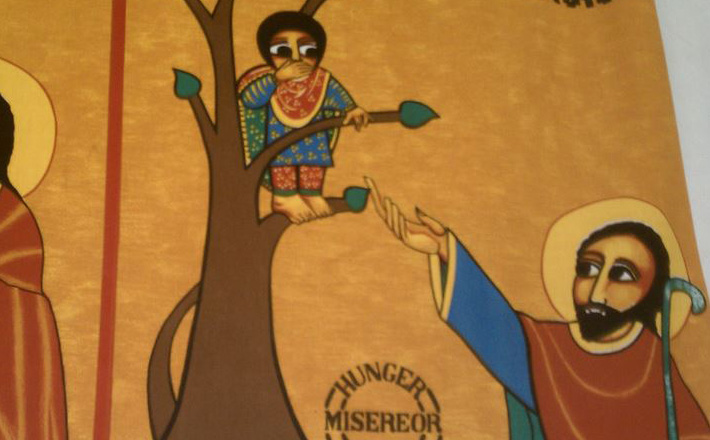Commentary on Isaiah 1:10-18
When I come to church, I do not usually imagine God covering the divine eyes out of disgust for my worship, but this is the exact image this passage places before its readers.
The poem examines the interplay of sin and sacrifice, asserting that one can negate the efficacy of the other. This is not a new theme in Israelite prophetic literature; Amos 5:21-24 makes a similar assertion. Social injustice nullifies sacrificial good.
It is interesting that this message is part of the opening of the book of Isaiah. The first 39 chapters of the book reflect the devastating invasion of the Assyrian army into the Levant in the eighth century BCE. The Assyrians had built a powerful military force and sought to control the whole Fertile Crescent. First they fought with Babylon for control of Mesopotamia, then set their sights westward, hoping eventually to conquer Egypt. Nations like Israel and Judah stood in their way. The prophecies in the first part of the book contain oracles and later material that address the widespread devastation wrought by the Assyrians. The larger nation of Israel fell to this army in 722, and Jerusalem itself was besieged, teetering on the brink of disaster. The verses immediately preceding this passage reference this siege.
Although the book of Isaiah is often associated with its amazing poems of hope, for a utopian world, much more frequent are poems such as this one that not only reflect the devastation of the invasion, but present the invasion as God’s punishment for their sins. What is important to notice here, however, is that the people are described as appropriately pious. They are making sacrifices, they are attending to their religious obligations. These verses do not accuse them of worshiping other gods. They are law-abiding worshipers of Yahweh … or at least they think they are.
This section contrasts the care that they give to liturgical practice with their disregard for the poor and marginalized within their own community. It may not be obvious to a contemporary audience, but the sacrificial system was hugely expensive. The daily sacrifices referenced in this passage consisted in what are called “whole burnt offerings,” meaning that edible food, in the form of meat, vegetables, and grains were placed on the altar and completely burned as a way to send them up to God. The amount of food was increased on Sabbaths, and even more on the New Moon. The “festivals” referenced in Isaiah 1:14 were probably the three major festivals in Israel’s liturgical calendar, when the amount of food burned was enormous.
What is important to notice is the way in which the passage contrasts these sacrifices with the fate of the oppressed, the orphan, and the widow. These were the very groups that would have had the least access to good food. In fact, few Israelites would have eaten meat on a regular basis, and for the poorest in the community their own access to meat might have been only on festival days like the ones listed here. The passage, therefore, contrasts the extravagance of the sacrificial system with the destitution of large numbers in their own community.
The passage is clearly addressed to the elites, in particular the royalty. Kings were the ones who furnished much of the food for the sacrificial feasts. They were also the ones in charge of the judiciary system for non-landowners, i.e., orphans (poor or disenfranchised males) and widows (women not attached to a landowning male). The activity that Isaiah 1:17 exhorts would play out within the judicial system.
The passage also engages traditions about the city of Sodom, addressing the elite as “the rulers of Sodom.” In Genesis 18-19, Sodom is destroyed because of the widespread injustice in the city. While that lack of social duties is illustrated by the violent sexual abuse of male guests in chapter 19, none of the other eighteen references to Sodom in the Old Testament make reference to the incident at Lot’s house. Instead, Sodom is simply the wickedest city imaginable; Ezekiel 16:49 states that the people of Sodom were destroyed for their “excess of food, and prosperous ease, but (they) did not aid the poor and needy.”
The temple plays a central role in the book of Isaiah, and many scholars view chapter 1 as an introduction to the whole book. Isaiah’s call in chapter 6 takes place in the temple. The poem that opens the second part of the book in chapter 40 contains a satirical condemnation of the Babylonian temple ideology. But it is the third part of the book (chapters 56-66) that is framed by passages about the temple, this time, the second temple, rebuilt after the return of the exiles from Babylon. Chapter 56 opens with the end of our passage, urging the new community to “maintain justice.” It then goes on to describe a worshiping community that includes all of those left out in the system used during the monarchy. The book ends with a vision of the whole world that has become God’s temple, a universal temple no longer in need of animal sacrifice. Our verses from Isaiah 1 seem to anticipate the book’s end.
This passage from Isaiah challenges contemporary communities of faith to align their practices with the ethics embodied in their liturgical rituals. It reminds us that liturgy creates an ethical worldview, and for the book of Isaiah this is an ethic of inclusivity. Who are the Isaiah’s of today’s world? Perhaps they are those who are refusing to come to our institutional churches, the “nones,” because they too see a conflict between what is preached and what is practiced. Perhaps the self-imposed exile of so many of our younger members is really the voice of Isaiah reminding us that God does not listen if our religious life is only defined by our liturgical practice.


October 30, 2016